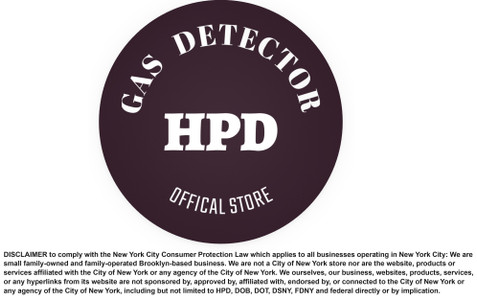New NYC Law Requires Natural Gas Alarms in Homes and Buildings with Gas Appliances
In a significant move towards enhancing safety, New York City has introduced a new law mandating the installation of natural gas alarms in all homes and buildings equipped with gas appliances. This legislation, driven by safety concerns and recent incidents involving gas leaks, aims to protect residents from the potentially fatal consequences of natural gas exposure.
The Importance of Natural Gas Alarms
Natural gas, while an efficient and commonly used energy source, poses serious risks when leaks occur. These leaks can lead to explosions or carbon monoxide poisoning, both of which can be deadly. Unlike carbon monoxide, natural gas is detectable by smell, but by the time it's noticeable, the concentration may already be at dangerous levels. Natural gas alarms are designed to detect leaks at low concentrations, providing an early warning system that can save lives.
Key Provisions of the New Law
-
Mandatory Installation: All residential and commercial properties with gas appliances must install natural gas alarms. This includes homes, apartment buildings, and businesses that use gas for heating, cooking, or other purposes.
-
Location and Maintenance: The law specifies that alarms must be installed in areas where gas appliances are located. Regular maintenance and battery replacement (for battery-operated alarms) are required to ensure functionality.
-
Enforcement and Penalties: Property owners are responsible for compliance. Failure to install or maintain alarms can result in fines and other penalties.
-
Implementation Timeline: The law provides a grace period for installation, giving property owners time to comply. Details on the timeline and any available assistance programs for installation will be outlined by the city's Department of Buildings.
Summary of Gas Detector Code NYS LL157
The New York State Local Law 157 (LL157) sets out specific requirements for the installation and maintenance of natural gas detectors. Here’s a summary of the key points:
-
Scope and Application: LL157 applies to all buildings and residences that use natural gas. This includes single-family homes, multi-family dwellings, and commercial properties.
-
Detector Specifications: The law mandates that the installed natural gas detectors must meet certain standards, ensuring they are capable of detecting gas leaks accurately and reliably. Detectors should be UL-listed or meet equivalent standards.
-
Installation Guidelines: Detectors should be installed in locations where gas appliances are present, such as kitchens, basements, and utility rooms. The exact placement should follow manufacturer recommendations and guidelines to maximize effectiveness.
-
Maintenance Requirements: Property owners must ensure that detectors are regularly tested and maintained. This includes replacing batteries as needed and ensuring that hardwired detectors remain connected to a power source.
-
Enforcement and Compliance: Local authorities will be responsible for enforcing the law. Property inspections may be conducted to ensure compliance, and non-compliant property owners may face fines or other penalties.
-
Educational Outreach: The law also includes provisions for educating the public about the importance of natural gas detectors and how to properly install and maintain them. This is crucial for ensuring widespread compliance and maximizing safety benefits.
Conclusion
The introduction of the new NYC law requiring natural gas alarms is a proactive step towards enhancing public safety. By ensuring that all homes and buildings with gas appliances are equipped with these detectors, New York City aims to prevent tragedies caused by gas leaks. Property owners should take note of the requirements and ensure they comply within the specified timeline to avoid penalties and, more importantly, to protect the lives of occupants. The summary of NYS LL157 underscores the detailed approach taken to ensure that the installation and maintenance of gas detectors are standardized and effective.
DISCLAIMER to comply with the New York City Consumer Protection Law which applies to all businesses operating in New York City: We are small family-owned and family-operated Brooklyn-based business. We are not a City of New York store nor are the website, products or services affiliated with the City of New York or any agency of the City of New York. We ourselves, our business, websites, products, services, or any hyperlinks from its website are not sponsored by, approved by, affiliated with, endorsed by, or connected to the City of New York or any agency of the City of New York, including but not limited to HPD, DOB, DOT, DSNY, FDNY and federal directly or by implication.
DISCLAIMER These codes may not be the most recent version. The State / federal or other regulation department may have more current or accurate information. We make no warranties or guarantees about the accuracy, completeness, or adequacy of the information contained on this site or the information linked to on the state site. Please check official sources.
The requirements for detector are determined by intended use and by applicable regulation. The BUYER is responsible for determining the appropriate detector needed. WE makes no warranty or representation of suitability of a detector to any code or for any specific application. IT IS THE CUSTOMER'S RESPONSIBILITY TO ENSURE THAT THE DETECTORS THE CUSTOMER ORDERS ARE IN COMPLIANCE WITH ALL STATE, FEDERAL, LOCAL, AND MUNICIPAL LAWS. Please review terms and conditions prior to purchase.
For more information about what is required, see the laws that are referenced and the rules applicable to your city and state. This page is for informational purposes only and is not intended as legal advice, professional advice or a statement of law. You may wish to consult with an attorney.




